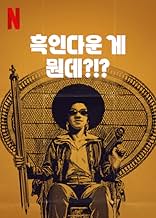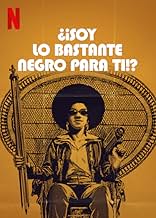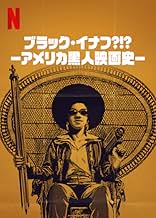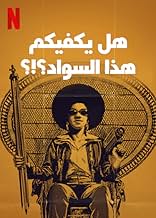Tracks the history of Black cinema, focused mainly on the '70s, with archival and new interviews with many of the key players from the era.Tracks the history of Black cinema, focused mainly on the '70s, with archival and new interviews with many of the key players from the era.Tracks the history of Black cinema, focused mainly on the '70s, with archival and new interviews with many of the key players from the era.
- Awards
- 4 nominations total
- Narrator
- (voice)
- Self
- (as Louise Archambault Greaves)
- Self
- (as Jim Signorelli)
- Director
- Writer
- All cast & crew
- Production, box office & more at IMDbPro
Featured reviews
The bad: but after an hour this documentary veers of into all sorts of directions, becoming disjointed and long in the tooth.
It is as if this director simply had no control over his urge to namedrop as many film classics as possible and then start analysing what was wrong with them.
Recommended watch for the first hour, but I fear not many will stay focussed till the very end, because this documentary unfortunately peters out after the first hour.
Basically, the issue here is that the film maker has decided that he wants to cover a LOT of Black films, which forces him to deal with some of them very quickly. One of the seven previous viewers attributes this to a desire on Mitchell's part to show off how many Black films he has seen, but that was not my impression. Rather, it's clear that he is fascinated with a lot of these movies, and intent on sharing his fascination and knowledge with us. That's hard to do in a movie, though, unlike in a book. Mitchell might have thought about doing what Ken Burns has done with some of his documentaries: focus on the most telling things in the movies themselves, and then provide the rest of the information in an accompanying picture book.
Books are good for annotated lists. Movies, not so much.
On the hand, because Mitchell sometimes seems like he is trying to be encyclopedic, some of the seven previous reviewers have criticized him for leaving out X or Y Black film or star. A few have a point, but others didn't pay attention. One complained that Mitchell left out James Brown, for example, which is not true. There is a very striking scene of Brown standing shirtless in a doorway, in all the glory of his virile, muscular, and very angry masculinity. It would have been nice to learn if he was offered roles other than those, but that would have taken more time than Mitchell had in this movie.
The same is true of some of the other previous criticism. Those viewers just didn't watch closely enough.
My take on this is that it was interesting for what it offered, but that it often left me wishing for more than just a tidbit on a given interesting movie. So, I guess, I would have preferred less encyclopedic coverage and more in-depth analysis of fewer movies.
On the other hand, I don't regret having seen any of what I saw.
Mitchell clearly knows this material. He should definitely treat us to an accompanying illustrated book, where he is not limited by time.
Mitchell breaks down how Black filmmakers and actors fought to define themselves on screen, pushing past racist tropes and reclaiming space in an industry that never wanted to give them a real seat at the table. He doesn't just highlight classics - he contextualizes them, showing how these films weren't just entertainment but acts of defiance and self-determination. And the archival footage? Incredible. The interviews? Stacked. When you've got Samuel L. Jackson, Laurence Fishburne, and Whoopi Goldberg weighing in, you know it's legit.
Beyond the history, what makes this film so powerful is how it connects the dots to today. Hollywood still sidelines Black voices, still erases contributions, still acts like representation is a trend rather than a necessity. Mitchell makes it clear that these battles aren't new, and that's what makes this documentary so frustrating-but also so important.
If you care about film, Black culture, or just understanding why things are the way they are in Hollywood, Is That Black Enough for You?!? Is essential. It's eye-opening, validating, and at times infuriating, but more than anything, it's a reminder that Black cinema has always been about more than just movies - it's about power.
Unfortunately, there are two major problems with this documentary. First is it skips over a lot. If not completely skipping it only skims the surface of those films, performers and filmmakers. Some of which it can be argued are more important that a lot that was included. Often they opted to cover & present as more influential fairly obscure films (never even released on DVD) rather than more successful films. Still what it did cover was entertaining.
Second, it made it sound like much of black cinema especially the 1960's to 1980's was only for black film goers. Some of these movies were successful because they also reached a white or other audience. Movies like Shaft, Coffey & others they mentioned were simply excellent movies with excellent performances, period. Funny they kind of mention that Motown music was only for black audience. Ridiculous. Even the Beatles recorded a couple of Motown songs.
I will rate this 7 out of 10, mainly for being entertaining. Plus I did learn about some films I've never heard of.
One of the more unexpected aspects is it's inclusion of experimental films, from animation to split screen. There is minimal focus on this but it does highlight ambitious storytelling and filmmakers responses to a restrictive system.
Did you know
- GoofsWhile discussing Les Évadés (1994), the narrator identifies Rita Hayworth as white. Hayworth's real name was Margarita Carmen Cansino, and she was of Romani descent (an Indo-Aryan ethnic group, also known by the term "Gypsies"). She had her name changed, and appearance slightly altered, to aid her career. Prior to that, as Rita Cansino, she had been limited to smaller exotic roles.
On a related note, towards the end of The Shawshank Redemption, Andy has replaced the poster of Rita Hayworth with a poster of Raquel Welch. Welch was born Jo Raquel Tejada, but went by "Raquel Welch" for the sake of her career (to avoid getting trapped into roles available to Latinas). She did not acknowledge her true heritage until she worked on American Family (2002).
- Quotes
Harry Belafonte: Not one picture that I turned down did I regret not doing. I didn't resent any of them. I'm glad others got an opportunity and went off and did it, but my initial... First and foremost, I'm an artist. I'm an actor. And I came out of a school with Marlon Brando, Walter Matthau, Rod Steiger, Tony Curtis, with a director that gave us no quarter. I'm not gonna do anything other than what I think is worthy of being done. And fortunately for me, I was a runaway success in the world at large because I had a globe so passionately approving of my presence in their midst that nobody could dismiss the fact that that thing on the horizon called Belafonte could really not be fucked with. Because anytime anybody came up and gave me an ultimatum, I said, "Fuck you. I'm going to Paris. I'll probably live there if I like, but I... I have a destination that answers your denial of what I could be."
- ConnectionsFeatures A Fool and His Money (1912)
- How long is Is That Black Enough for You?!??Powered by Alexa
Details
- Release date
- Country of origin
- Official site
- Language
- Also known as
- Is That Black Enough for You?!?
- Production companies
- See more company credits at IMDbPro
- Runtime2 hours 15 minutes
- Color
- Sound mix
Contribute to this page






































